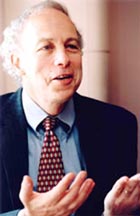Globalization has brought mankind its largest shift yet. Many are unfriendly to the realities that accompany it. However, the resulting mesh of peoples and cultures as a result of the global systems are difficult to argue against.
Diasporas are now on a global scale and include the whole of humanity. The exchanges of belief systems and ideas have transformed entire cultures.
The downside, however, is that with globalization comes conflict of epic proportions. The two almost seem to go hand-in-hand. In the 20th century alone, the world has observed the bloodiest period in human history.
Many cope with the increasing polarization and imposing violence and become convinced that it is human nature that leaves us prone to conflict with war as an inevitable outcome, while many others remain optimistic. Though conflict is unavoidable, it is always resolvable.
With that idea, John Marks, Founder and President of Search for Common Ground (SFCG), set out in 1982 to bring resolution to populations victimized by conflict and war.
On Monday, March 7, 2005, Marks visited UMB as a part of the annual Benjamin and Sylvia Slomoff Visiting Lectureship to inform the campus about his organization’s media initiatives in the quest to find cooperative solutions.
Marks believes that, “we can either be paralyzed by the threats that many perceive in this globalization, or we can approach it as an opportunity. We view it as the latter.”
His organization has headquarters in Washington, D.C., and Brussels, Belgium, that serve as the logistical and financial backbone for 13 field projects all over the world. Some field locations include Angola, Iran, Burundi, Indonesia, Liberia, Sierra Leone, and Macedonia.
The initial stages of the SFCG project “focused on building bridges between East and West” at the height of the Cold War, says Marks. Today, as the project continues, “that audacity still shapes our work.”
SFCG’s vision is to assist in bringing about a world where differences among people stimulate social and political progress, reconciliation between conflicting peoples is the norm, shared interests bring forth a deep respect overshadowing our differences, and human beings are safer and more secure overall.
“Our mission is to transform the way the world deals with conflict: away from adversarial approaches, toward cooperative solutions,” says Marks.
There are five core principles by which SFCG operates: 1. conflict is both normal and resolvable; 2. common ground is not about compromise; 3. conflict can be transformed; 4. peace is a process; 5. humankind is interdependent.
Marks states, “We’ve come to recognize underlying principles for dealing with conflict constructively. These are not principles that we’ve invented. Rather, they’ve been revealed in the process of doing our work, and their truth and validity have been tested. They are not unique to us.”
Marks affirms, “We do our work because we think it makes a difference. Our activities in Burundi have played a key role in breaking down ethnic fears and hatred. In Sierra Leone, we are helping the country emerge from a dark night of violence. In Macedonia, researchers have shown how our hugely popular children’s television series has changed kids’ attitudes towards those of other ethnic groups.”
Macedonia is where Marks’ organization achieved much of its success.
In 1994, SFCG opened an office in Macedonia where inter-ethnic tensions were high.
Some of the initial projects included supporting multi-cultural education for school children through a program called “Mozaik” by bridging cultural gaps between the Macedonian, Albanian, Serbian, and Turkish populations with a focus on teaching children interpersonal conflict resolution skills.
The 1999 war in Kosovo brought Macedonia its refugee crisis when 400,000 Kosovars flooded through the Macedonian borders. The crisis put SFCG’s preceding efforts to the test.
Marks believes the work in Macedonia before the crisis was “a preventive action.” He continued, “You need to strengthen the immune system of the society.
The organization’s website (www.sfcg.org) states, “Our projects made an important contribution to weathering the crisis.
More recently, SFCG premiered a television program in Macedonia called “Nashe Maalo.” The television program was created to promote intercultural exchange, understanding, and tolerance between Macedonia’s many children.
According to Marks, the number of Macedonian children who made friends with children of different ethnic backgrounds increased. According to Marks, previous to “Nashe Maalo,” approximately 30 percent of Macedonian children mingled with children of Albanian, Turkish and Serbian backgrounds. After eight episodes, the number rose to 60 percent.
“We changed the way Macedonian children look at other children,” he says. “Multiculturalism has become the national idea.”
As conflicts and tensions increase, more and more of the world’s population watches on in disbelief wondering whether conflict is the new norm and if it will ever come to an end.
In the meantime, it is hard for many to imagine single-handedly changing the world, bringing hope to conflict, and cease-fire to war. Many strive, at the least, to make it better for some.
“Whether we like it or not,” says Marks, “we are all in our own way members of minority groups that need to be able to get along with the majority of the people in the rest of the world.”
Search for Common Ground does its best to provide the glimmer of hope amidst the often-hopeless landscape. The organization’s website quotes a profound and noteworthy statement by Senator George Mitchell: “There is no conflict that cannot be resolved. Violent conflict is created and sustained by human beings, and it can be ended by human beings.”





















































